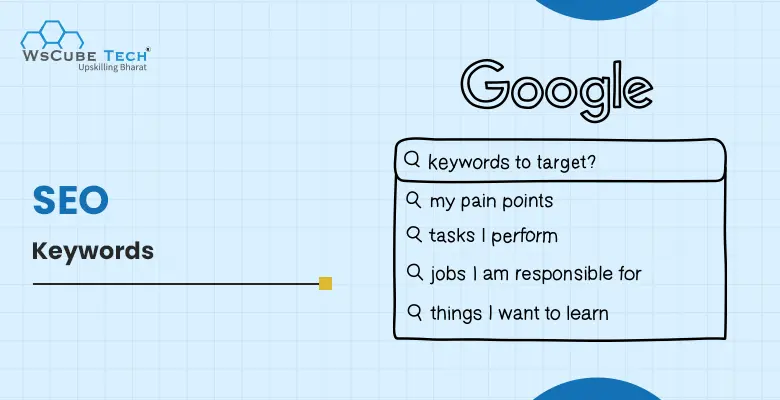Today, internet users rely on digital channels to find the best products, services, and brands. They use their laptops or smartphones, open a web browser, and enter the key terms on the search bar. The moment they hit ‘Enter’, they get ample results. However, they prefer visiting the top five links that look promising and credible. They click on those links, and voila, they have the answers to their queries.
The words users type into search bars are crucial to how they find a website or content they are looking for. These search terms are known as keywords. If you also want people to find you, you need to gain a fair understanding of keywords and how they are important for your SEO campaigns. Enroll in an SEO course and learn the secrets behind ranking your website on search engines and driving organic traffic.
In this blog, we will explain everything you must know about SEO keywords and how to use them on your website to strengthen your content strategy.

What Are SEO Keywords?
Keywords are phrases or words users type into search engines to find answers to queries. They are also known as search queries, as people use these terms to discover relevant content. Incorporating keywords into the content strategy enables search engines to find your content when users look for related queries and rank your website in SERPs.
In other words, keywords are used in web content to boost its search engine ranking when users search for the same terms. So, we need keywords in SEO to stay relevant in the market and for related searches. It improves the chances of users finding our content in search engine result pages.
Upskill Yourself With Live Training (Book Free Class)
There are short-tail keywords (one or two words) and long-tail keywords (3-6 words). If we convert every image, video, or copy to just words and phrases, we’ll get primary keywords. It is crucial for marketers to be good at keyword research according to the topic, product, and service to create effective SEO and PPC campaigns.
For example, ‘digital marketing course’ is a keyword, but ‘the best digital marketing course in Delhi’ is also a keyword but a long-tail keyword.
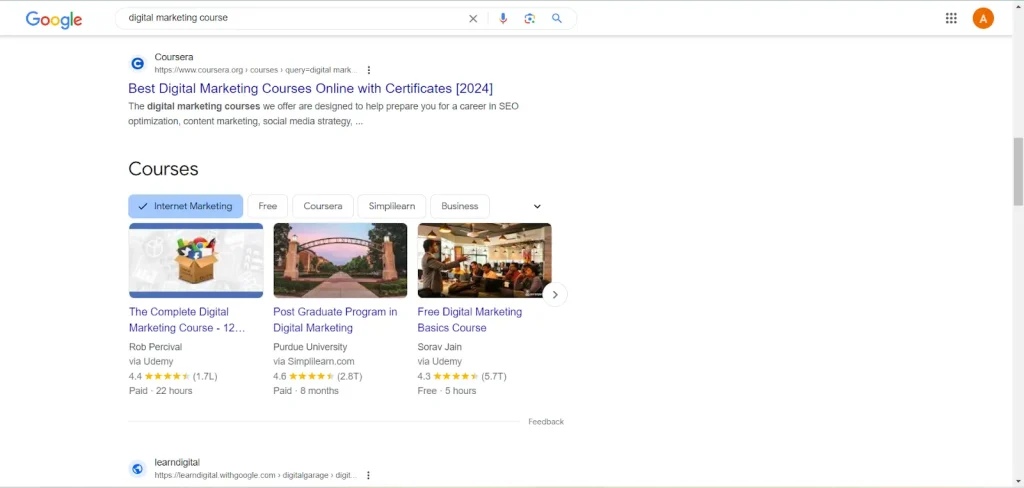
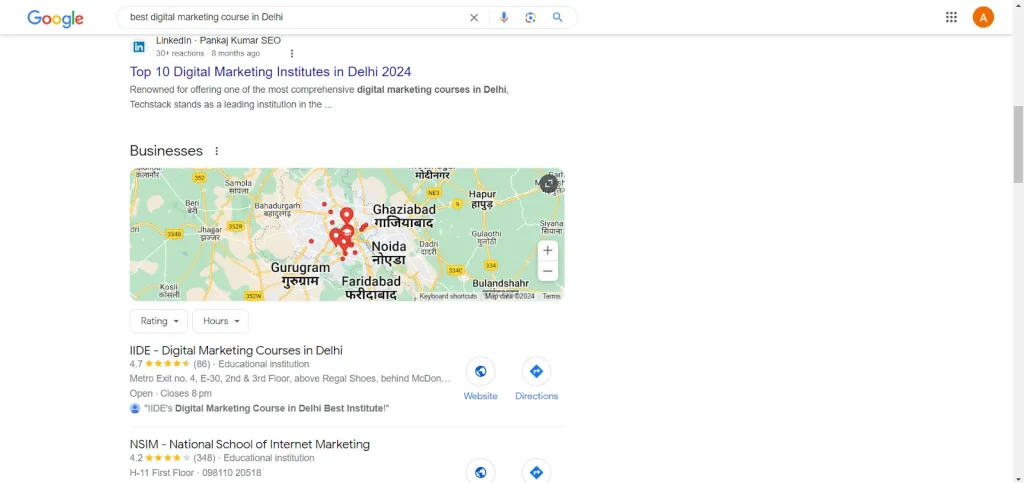
Also Read: Top 8 Benefits of SEO Marketing in 2025 (Importance)
Why Are Keywords Important?
Google and other search engines consider numerous factors when assessing a website for search engine rankings. We may not know all of those aspects, but keywords are certainly one of the key factors. Keywords help search engines understand what a web page or website is about and if it’s relevant to the search query.
Search engines track keywords to rank useful websites for different searches. It also ensures that users get information they seek.
Moreover, keywords help marketers develop a well-defined content strategy and determine the topics and pages to include on the website. They can include relevant terms and phrases to boost the rankings of web pages and drive traffic.
Other essential goals of incorporating keywords for search engine optimization are identifying the search intent, creating relevant content to answer questions, using target keywords at the right place, and reaching the potential audience.
We include keywords in pillar and cluster pages to produce content that aligns with user interests. However, the type of keywords we use and the way we select keywords can vary according to the marketing goals and platform for which we are writing content.
How to do Keywords Research in SEO?
Keyword research is the base of any successful SEO strategy. By knowing the terms and phrases that your audience uses to search online, you can tailor your content to their needs and boost your site’s visibility in SERPs.
Below is the step-by-step guide to help you conduct adequate keyword research:
1. Brainstorm Seed Keywords
Brainstorm broad topics that are relevant to your niche or industry. Consider the products/services you offer, the issues you solve, and the information your target audience seeks. Further, consider queries they might ask and topics they might be interested in to know more about.
2. Enlarge Your Keyword List
Once you have a list of seed keywords, use several methods to expand it. Check the search suggestions when you enter keywords into search engines like Google. These suggestions offer valuable insights into popular search queries related to your seed terms.
3. Leverage Keyword Research Tools
Numerous paid and free keyword research tools assist in enhancing your research process. Free options like Google Keyword Planner offer primary search volume data and related keyword suggestions. Paid tools like SEMrush and Ahrefs provide in-depth insights, including search volume estimates, competition level, and keyword difficulty.
4. Analyze Search Intent
This refers to the underlying reason behind a user’s search query. Are they looking for information (informational), trying to buy something (transactional), or aiming to complete a specific action (navigational)? Identifying search intent is vital for selecting relevant keywords.
5. Research Competitor Keywords
Keeping an eye on your competitors is a great way to uncover valuable keyword opportunities. Analyze the keywords your competitors rank or look at the keywords in their top-ranking content. Consider targeting relevant keywords with lower competition to rank higher in search results.
6. Refine Your Keyword List
Now, it’s time to refine your keyword list by prioritizing keywords depending on search volume, competition level, and relevance to your target audience. Many tools out there allow you to filter keywords by search volume and keyword difficulty, helping you choose terms that offer a good balance of search traffic and ranking potential.
7. Check-out Long-Tail Keywords
Consider long-tail keywords – phrases that are precise to your niche. Although they have lower search volume than broad keywords, they often boast higher conversion rates because they target users with more apparent purchase intent.
8. Stay Up-to-date
Keyword trends constantly evolve. It’s essential to revisit your keyword research periodically. Tools like Google Trends help monitor search volume fluctuations and identify emerging trends within your niche. Frequently update your keyword strategy to ensure you target your audience’s relevant and valuable terms.
Following the above steps and consistently refining your keyword research process will better understand your target audience’s search behavior and unlock the door to driving better traffic to your site.
What Are the Different Types of Keywords in SEO?
There are mainly two types of keywords in search engine optimization:
- Short-tail Keywords
- Long-tail Keywords
1. Short-tail Keywords
Short-tail keywords comprises one to two words. For example, black tie, summer dress, apple, etc. These keywords have high search volume, which means a lot of users are searching for these terms. Hence, competing for higher rankings for these keywords can be challenging, especially for a new business or website competing with big brands that are already popular and have optimized websites for years.
So, even if short-tail keywords sound more appropriate and relevant for your website, you might have to face tough competition to achieve the top rank for these search phrases. Websites and businesses who have recently entered the market avoid these keywords for SEO and prefer long-tail phrases.
2. Long-tail Keywords
Long-tail keywords can have 3-10 or even more words depending on the question or query. For example, ‘the best and most affordable digital marketing services in Delhi.’ Unlike short-tail keywords, these phrases have lower search volume, which means less competition. As fewer people search for these keywords, there are better chances for websites to rank higher and reach more people.
In the beginning, new websites and businesses mostly opt for long-tail keywords to compete with established brands and reach a wider audience. Also, these keywords have clearer intent than short-tail keywords. Suppose a user searches for ‘pink dress’; it is unclear what exactly they are looking for. However, when a user searches for ‘buy an affordable pink dress for summer,’ search engines clearly know what they want and can provide useful information, listing all the relevant pages and links.

What Is Keyword Search Intent?
Users have a reason to use a specific keyword while looking for their search queries. This reason is known as search intent. It tells us the ‘why’ of each search query so we can tailor the web content to provide value to users, offer the best answers, and ensure a seamless experience.
However, you need to understand the role and impact of keywords in search engine optimization. This allows you to not only plan a better content strategy but also ensure its effectiveness.
You can identify search intent by asking a few important questions:
- Is there an intent to buy something?
- Are users looking for options or gathering information about a particular product?
- Are users looking for the meaning of a word?
- Are they looking for a website they already know?
Once you have answers to these questions, you can find search intent, which usually falls into the following categories:
- Transactional (buyer) intent
- Commercial intent
- Navigational intent
- Informational intent
1. Transactional
Transactional search intent shows a strong desire or intention to make a transaction. It includes more specific words like ‘for sale’, ‘buy’, or ‘subscribe’. Also, these keywords can even define a product or service exactly, like ‘pink summer dress’.
Examples of transactional intent are- buy hair straightener under ₹1000, buy video game online, friendship quotes, buy cheap air tickets, etc
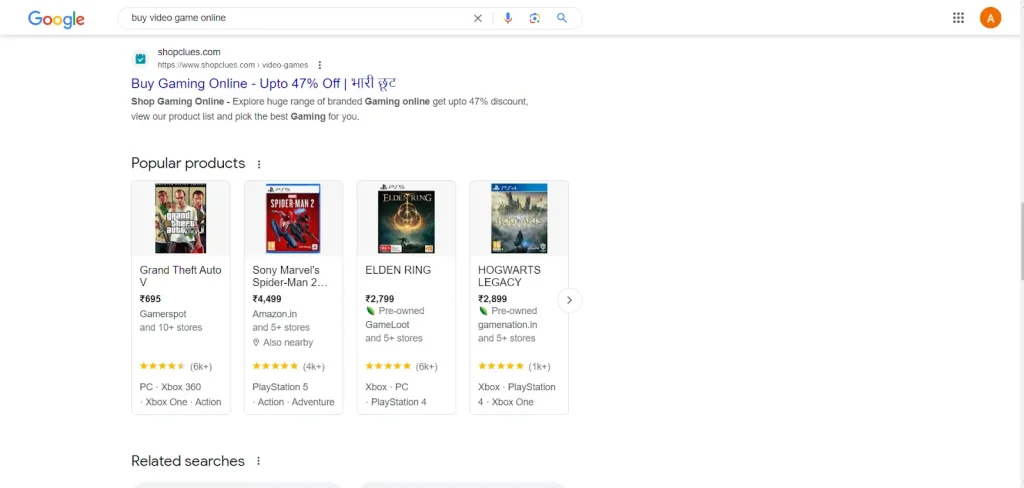
Also Read: 10 Best SEO Keyword Research Tools in 2025 (Free & Paid)
2. Commercial
Commercial search intent shows that users are seeking information about a product, service, or brand before making the buying decision. They may not buy the product immediately but it would be good to grab their attention and tell them about your brand as they might buy the product in near future. So, whenever they are ready to buy, your product must be their first choice.
Examples of commercial intent are- types of hair dryer, best running shoes, best shoes for gym, etc.
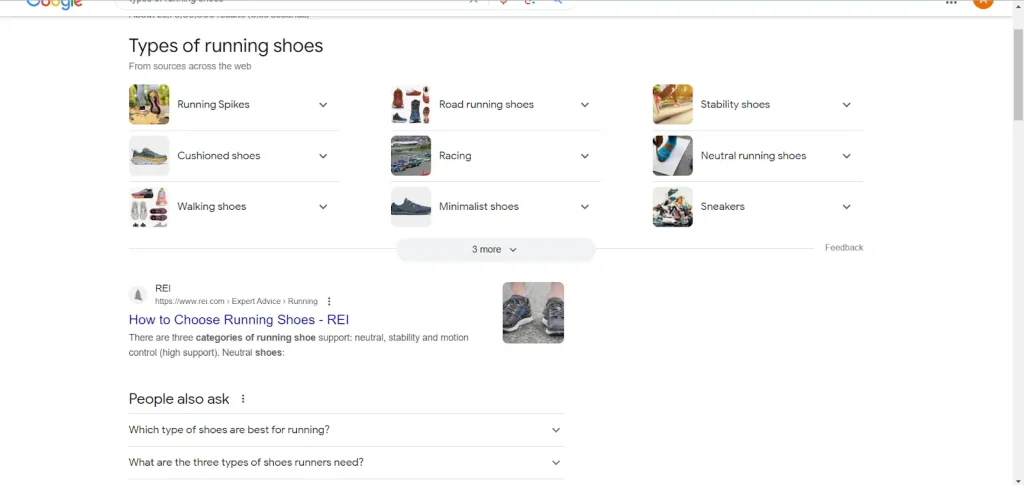
3. Informational
Informational intent shows that users are looking for facts, directions, or knowledge with no intention of making a transaction. Although these SEO keywords may not increase your ROI, they can still add value, so targeting them through SEO is highly recommended.
Suppose a web page that targets keywords with informational intent is one of the top-performing pages on your website and drives heavy traffic every month. However, users coming to your site through these keywords intend to buy your product or subscribe to your platform. Still, this traffic is valuable as it brings your website in front of the target audience. Some of these users may follow your company on social media or sign up for your newsletter. So, whenever they need to buy something you offer, your brand will be on top of their mind.
Examples of informational search intent are ‘how to improve search engine ranking?’, ‘what does SEO mean?’, etc.
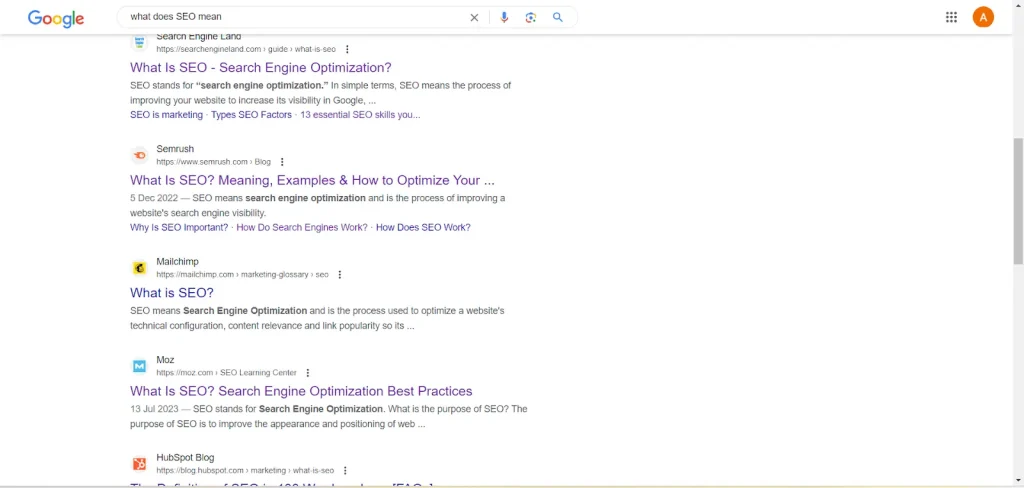
4. Navigational
Navigational intent indicates that users are here to find a specific website or content. You should focus on these keywords only if you are the brand someone is looking for using the exact name; otherwise, there is no use in targeting these keywords.
Examples of navigational keywords are Axis Bank login, Zara online shopping, WsCube Tech YouTube channel, etc.

Interview Questions for You to Prepare for Jobs
| Digital Marketing Interview Questions | SEO Interview Questions |
| Email Marketing Interview Questions | Content Writing Interview Questions |
Also Read: What is Technical SEO? Beginners Guide in 2025
Where to Use Keywords on a Web Page?
Once you select relevant keywords in SEO, you need to decide how to use them throughout the page. This is known as keyword placement and is a crucial part of on-page SEO. Content writers and SEO experts take care of placing keywords in the right places. There are some basic rules defining where to place keywords on every page so that bots and users can be assured that they have found what they are looking for. Moreover, search engines can identify the main topic of the content or page and provide relevant answers to specific queries.
Here are a few locations where you must use keywords:
1. URLs
URL is the web address of a page that we see in search results. It is a link that appears on the address bar. URLs must be easy to read, SEO-friendly, and include target keywords. Also, they must have a simple structure right from the beginning to avoid any changes in the future. In case of any issue, you might need to rework the URL structure, set up 301 redirects for old pages, and add keywords to the new URL.
2. Title Tags
Title tags appear in the search results, and we see them in the browser tab. These tags are optimized for robots but are written for humans, so you need to strike the right balance. You must create compelling and relevant title tags to encourage more clicks. However, avoid the pitfalls of click baits. Stay away from misguiding users to get more clicks by creating sensational titles that have nothing to do with the content. Your page must meet user intent and offer helpful information to users.
3. Meta Description
A meta description also appears in the search results. Each page has a unique description. It must be concise yet informative, and when created correctly, it has the power to influence user behavior. It must also include keywords. In some cases, Google rewrites meta descriptions.
4. Content
The main content of the body should naturally include target keywords. Don’t throw keywords randomly on web pages because if they don’t make sense, they will be considered keyword stuffing, which is completely against the guidelines of all major search engines. Also, it can lead to a penalty, which will ultimately prevent your site from appearing on SERPs. Your goal must be to provide value to your visitors by writing compelling and quality content with correct keyword placement. Your content should be accurate, top-notch, engaging, and unique, which will send strong signals to search engines, showing the credibility of your page.
5. Page Title (H1)
The H1 tag is the title of the page or content. It should also include relevant keywords to demonstrate topic relevance and attract users.
6. Subheadings (H2)
Subheadings (H1, H2, H3, and so on) are important for any content design and management. Format your content correctly so users can navigate it easily and search engines can understand the information you are providing.

7. Images
Marketers and website owners often overlook image alt text because they think search engines don’t consider them during crawling. Yes, search engines can’t see images, but they can read them. Also, images add value to user experience, and alt text offers additional benefits by providing robot context for images.
Hence, it’s necessary to optimize images by using relevant keywords. However, you need to use keywords naturally in the alt text, ensuring it describes the image. If you force keywords in the alt text, it can hurt your SEO efforts and adversely affect traffic, search engine ranking, and sales.
You can optimize most of these elements even after publishing content except the URL, which you must avoid altering unless it’s absolutely necessary. When you add keywords in the listed places, it can work wonders for SEO. You may not see instant results, but you will witness growth gradually.
What are the Keywords Research Best Practices?
1. Know Your Target Group
Gain extensive knowledge about your target audience to craft an effective keyword strategy that resonates with their needs and search intent. By considering the hobbies and interests of your audience, you can reveal valuable insights that guide you toward relevant keywords aligned with their preferences.
2. Develop a Proper Understanding Of Your Niche
Understanding your niche allows you to make informed decisions about your keyword strategy. Gaining comprehensive insights into your niche allows you to pinpoint keywords and search terms relevant to your niche and audience, growing the potential for organic traffic generation.
3. Identify Seed Keywords
Seed keywords are the cornerstone of your keyword research. They contain broad terms or phrases relevant to your business, industry, or content. To accomplish this, leveraging the assistance of keyword research tools is essential.
4. Use Keywords Research Tools
Keyword research tools are invaluable for obtaining insightful data and improving your keyword strategy. Tools like SEMrush, Ahrefs, Google Keyword Planner, and others have multiple features, including search volume, related keywords, competition level, and trend analysis.
Inputting your seed keywords into these tools generates an extensive list of relevant keywords, allowing you to make wise decisions to optimize your content effectively.
5. Detailed Analysis Of Every Keyword In Your List
After creating a list of keywords, analyze the search intent of every keyword. To determine the search intent, input the keywords into a search engine, carefully examine the first page of the results, and observe the content and format of the top-ranking pages. It is important to perform this to identify and eliminate keywords from your list that don’t align with the intended purpose.These best practices on keyword research ensure that you concentrate on choosing the best keyword that will drive the right audience and maximize your efforts effectively. Want ot build career in SEO, join an online SEO course and outshine in this field.
FAQs on SEO Keywords?
In digital marketing, a keyword describes a word or a group of words an online user uses to search in a search engine. Keywords are important in an SEO strategy and the root of any content written for the web.
Keywords are the phrases and words searchers type into search engines to find what they want. For example, if you purchase a new jacket, you might type “men’s leather jacket.” Even though that phrase consists of more than one word, it’s still a keyword.
Significant search volume, high relevance, moderate competition, and a robust conversion rate are features of a good SEO keyword.
Yes, keywords are still essential for SEO. They can affect the way search engines rank your websites. The only difference from before is that the relevance and quality of keywords matter much more than keyword density.
Conclusion
We hope this blog helped you understand about keywords in detail and how to use them to amplify your digital marketing efforts. Now, go ahead and start your keyword research using effective and advanced tools. Make sure you pick only relevant keywords and take care of the points you just learned here.
Read more blogs:



